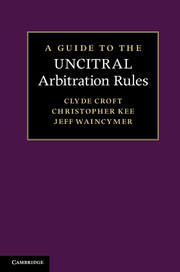Book contents
- Frontmatter
- Contents
- Preface
- Foreword
- Introduction
- Section I Introductory rules
- Section II Composition of the arbitral tribunal
- Section III Arbitral proceedings
- Section IV The award
- APPENDIX 1 United Nations Commission on International Trade Law (UNCITRAL)
- APPENDIX 2 Recommendations to assist arbitral institutions and other interested bodies with regard to arbitration under the UNCITRAL Arbitration Rules as revised in 2010
- Index
APPENDIX 1 - United Nations Commission on International Trade Law (UNCITRAL)
UNCITRAL Notes on Organizing Arbitral Proceedings
Published online by Cambridge University Press: 05 May 2013
- Frontmatter
- Contents
- Preface
- Foreword
- Introduction
- Section I Introductory rules
- Section II Composition of the arbitral tribunal
- Section III Arbitral proceedings
- Section IV The award
- APPENDIX 1 United Nations Commission on International Trade Law (UNCITRAL)
- APPENDIX 2 Recommendations to assist arbitral institutions and other interested bodies with regard to arbitration under the UNCITRAL Arbitration Rules as revised in 2010
- Index
Summary
Preface
The United Nations Commission on International Trade Law (UNCITRAL) finalised the Notes at its twenty-ninth session (New York, 28 May–14 June 1996). In addition to the 36 member States of the Commission, representatives of many other States and of a number of international organisations had participated in the deliberations. In preparing the draft materials, the Secretariat consulted with experts from various legal systems, national arbitration bodies, as well as international professional associations.
The Commission, after an initial discussion on the project in 1993,<1> considered in 1994 a draft entitled ‘Draft Guidelines for Preparatory Conferences in Arbitral Proceedings’.<2> That draft was also discussed at several meetings of arbitration practitioners, including the XIIth International Arbitration Congress, held by the International Council for Commercial Arbitration (ICCA) at Vienna from 3 to 6 November 1994.<3> On the basis of those discussions in the Commission and elsewhere, the Secretariat prepared ‘draft Notes on Organizing Arbitral Proceedings’.<4> The Commission considered the draft Notes in 1995,<5> and a revised draft in 1996,<6> when the Notes were finalised.<7>
- Type
- Chapter
- Information
- A Guide to the UNCITRAL Arbitration Rules , pp. 457 - 483Publisher: Cambridge University PressPrint publication year: 2013
- 3
- Cited by



